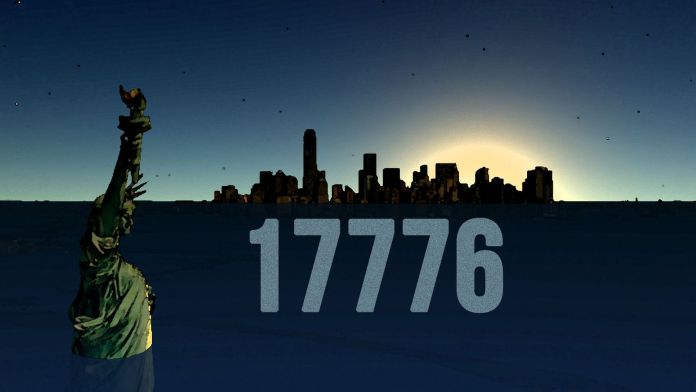The date is July 2, 17776, and you are watching a football game. This game is being played between Wyoming and Iowa. The field of play is Nebraska.
Yes, the entire state.
The game is tied, 24-24, and the next score wins. After starting on the line of scrimmage in Gresham earlier that morning, Wyoming running back Nancy McGunnell caught a screen pass, turned back a couple blocks, then started running down Road V until she hit Lincoln Creek. As of now, she’s just outside of Seward, about 117,000 yards away from the end zone, and she’s coming up fast. Trouble is, there’s a tornado headed towards her— an EF5— and she’s got the other team blocking her on all sides.
So, she takes her chances and runs up into the tornado, hoping that it’ll throw her somewhere downfield, where she can get a clearer route towards the goal line. It does, and by the time you switch off your television later that night, McGunnell is somewhere around Bee, Nebraska, waiting to make her next move.
This is Game #3887, as described in Chapter 2 of 17776, a digital multimedia fiction project written by Jon Bois and published through SB Nation in 2017. In the years since its publication date, 17776 has won a National Magazine Award for Digital Innovation and been longlisted by the Hugo Awards for Best Novella and Best Graphic Story. It’s been highly praised by critics for its balance of humor and existentialism, and its view count is currently somewhere in the millions. I love it dearly.
However, I often find it difficult to explain exactly what 17776 is about. The easiest way to describe it is that it is a story about what American football will look like in the future. However, it’s also a story about the wretchedness of humanity’s instinct for exploration, the tragedy of immortality, and the futility entrenched in the sameness of our ordinary lives. It’s a story about loneliness and found family, the impermanence of human structures, and the acceptance of limits. It is about fear and loss and love.
But also, it’s about football.
The story is set in an alternate(?) timeline where, in 2026, for some unknown reason, humans suddenly stopped being born, stopped getting sick, and stopped aging. Several years later, humans developed technology that prevented them from getting hurt, effectively making them immortal. As the world kept turning and people outlived their old fears of death and darkness, they found the time to settle their conflicts with each other and resolved to address crises that might never have been addressed otherwise. They figured out how to efficiently allocate their resources, preserve their cultures indefinitely, and even deal with the rising sea levels caused by global warming (which ended up drowning most of the cities on the East Coast).
However, with all of their biggest problems solved, humanity suddenly faced an unprecedented crisis: boredom.
It wasn’t a question of utopia; humanity had everything it needed to progress as a species. But without the sense of motivation usually impressed on them by the vague notion of “wasted time,” people no longer felt the need to make their lives more efficient. As one of the story’s narrators explains, “Efficiency is meant to save time, but their time is infinite. Why tell them to save something they have in infinite supply? You may as well tell them to dig up dirt and hoard it in boxes.”
Of course, humans still had their age-old instinct of exploration, the desire to expand beyond the Earth’s boundaries and see what the universe had in store for them. But, as it turned out, the answer wasn’t much. By the 3000s, most of the old satellites and probes shot into space during the last millennium had gone silent, and humans found themselves unable to travel beyond brief trips to uninteresting solar systems without risking serious damage to Earth’s limited resources.
In the end, humanity’s “perfect” eternity was far from it. They were alone, exhausted, and bored. They needed something to engage themselves, or else risk grave psychological damage.
Hence, football. Lots and lots of football.
There is much more to the story than is written here, but I think it’s best to let you explore the rest of the world of 17776 on your own. And what a world it is! Using written text, videos, gifs, Google Earth maps, and audio recordings from old football games, Jon Bois tells the story of a generation stuck in time, a generation forced to find purpose and order in the absurdity of play. Across 25 chapters, Bois takes his readers through several intertwining games and stories, slowly but surely broaching the idea that perhaps humanity is not defined by fame or fortune, but rather, how we outlive ourselves through our creativity.
And perhaps this is what continues to draw readers to 17776, even after all this time. There is much to be afraid of in a world in which normalcy seems to be slipping away from us with each passing moment, but if we support and inspire each other in those moments of weakness— rather than isolate ourselves from the only community we have— we may find ways to survive we’ve never thought possible.
We have ourselves, all of us.



